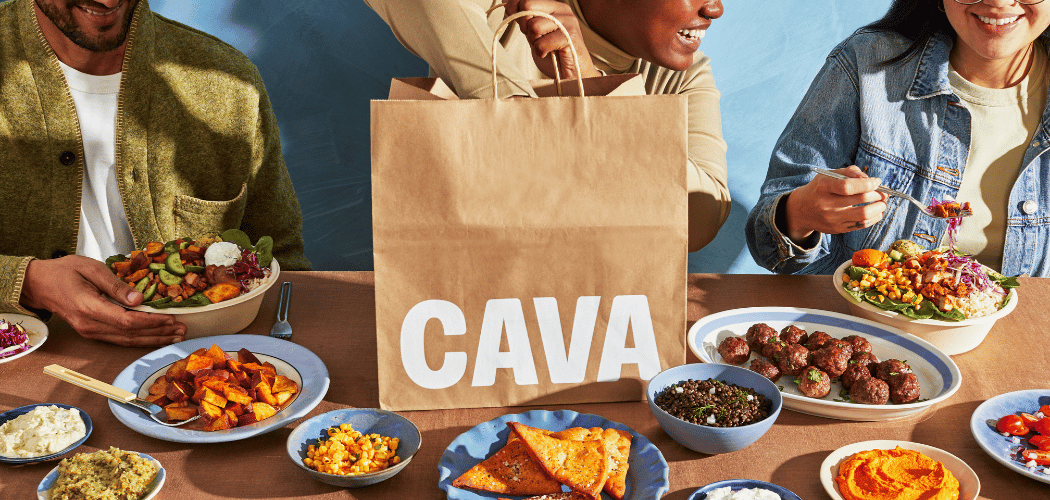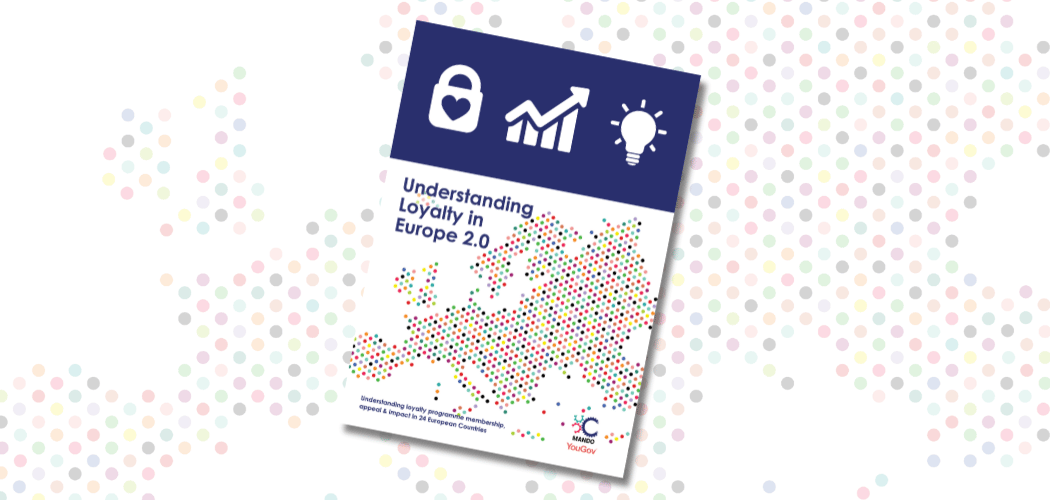In line with the rest of 2020, this year’s Festival of Marketing in the UK was very different to any I’ve had the privilege of attending before. And, just like 2020, the change brought the good and the bad. The new digital format brought the good: no early morning schlep across town, no enormous lunch queues, no missing speeches because you couldn’t get there in time or had a clash. But it also brought the bad: less inspiration, less buzz, less chance to network and meet your heroes. Instead, I had a week of squeezing inspiring content between client calls and work. Great, but not quite as exciting as usual.
By: Charlie Hills
2020’s experience could not have been more different to 2019’s. And it was a common theme of all the speakers — what’s better, what’s worse, what do we need to think differently about? And, how are marketers supposed to set plans in this turbulent time? And keep our teams motivated and happy? All interesting and important questions. So, inspired by the spirit of this year’s Festival and all its great speakers, here are 5 interesting challenges to raise for loyalty marketers everywhere.
1) How can you find out what’s going to really matter to your members next year?
It’s a hard thing to predict for any loyalty programme owner, in any year, now more than ever. The usual combination of analytics, research, insights from past years and trend reports that look ahead doesn’t seem to really cut it at the moment. The world is changing dramatically in ways we can’t foresee. What extra tools can loyalty marketers use to make predictions for 2021?
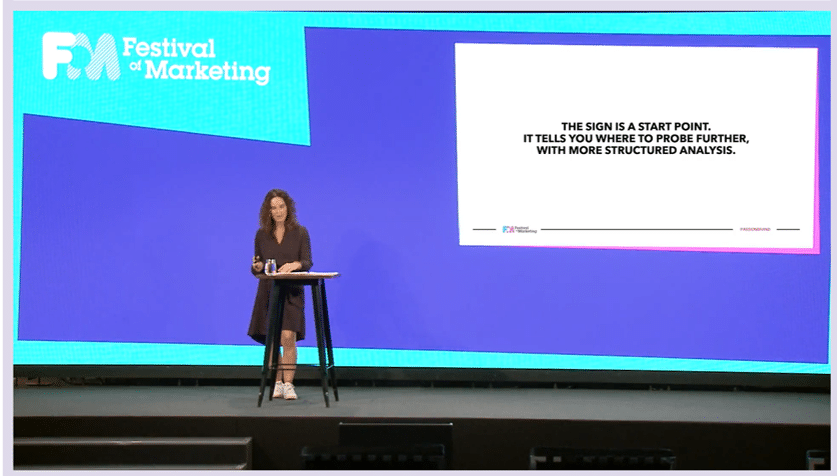
Dr Helen Edwards, Director at Passionbrand gave a brilliant speech that told marketers to look for the signs of change, for evidence of new things. She pointed out that, in these changing times “people are much harder to predict than we thought, and there isn’t really much ‘science’ that can be reliably applied to marketing.”
She made a powerful case for looking for the signs of change, then probing deeper to see if that sign can be built into an insight and then a prediction. For example, one sign she’d noticed was that there were shorter queues at Sainsbury’s, longer ones at her local farmer’s market. When she delved behind this sign, she unearthed a vast amount of research and insight about the trend in the UK towards localisation, and this trend’s acceleration due to Covid impacts. By exploring beneath a sign she uncovered a powerful insight and confident prediction towards increased localisation in the UK for 2021.
Takeaway: What signs can you see? What insights can you uncover? What trends can you therefore predict will matter for your members in 2021?
2) What are you doing to build a relationship with the customers of the future?
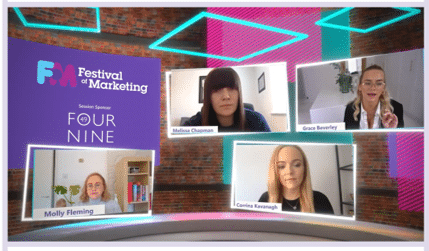
When we are facing the level of change and challenge we currently are, it’s easy to focus on the customers and members we have now. But the Festival talked a lot about engaging the Generation Z customers of the future too; how brands can engage, what matters to this audience and how to get it right.
I attended a fascinating panel about how to engage Gen Z women, featuring 3 experts in this field: Melissa Chapman (Jungle Creations), Corrina Kavanagh (Columbia Records UK) and Grace Beverley (TALA & SHREDDY. The panel focused on how Gen Z women have had their short-term plans turned upside-down, but that there is more social consciousness and community than ever before. That they are more motivated by personality led content than other formats (5x more engagement), that “social is there home” (5.9 hours a day is the latest stat), and that they have high expectations around authenticity. They hold brands to account. Melissa talked about this in terms of receipts “We need to live and breathe our values. They are an incredibly savvy generation. We are living in a time of receipts — there are receipts for everything now.”
Corrina also shared an interesting model from recent Sony research — the 8 engagement principles the brand now lives by to truly connect with a Gen Z audience:
- Passion
- Realness
- Social Justice
- Distinctiveness
- Representing
- Humility
- Vulnerability
- Achievement
Takeaway: How are you planning to engage Generation Z? What are your values? How do you live and breathe them and what can you do to demonstrate them?
3) What’s your Rewards Strategy? Does it involve Gaming?
When asked about rewards within their loyalty programme, most loyalty marketers think they have it nailed. They offer a specially curated blend of rewards and benefits that their members want, and most have adapted during Covid-19 times to offer rewards suitable to enjoy at home — movie downloads, free workouts, baking kits, BBQ meat packs, and food subscriptions are some of the amazing rewards that programmes like VeryMe Rewards from Vodafone or British Gas Rewards have offered.
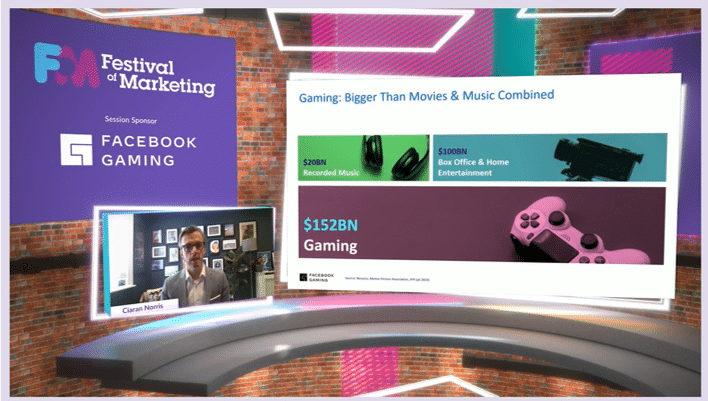
But, did you know that the gaming industry is bigger than movies and music combined? I attended Ciaran Norris’s from speech “Gaming, Growth & Generation Next”. He’s the Industry Manager, Console & XP Gaming at Facebook, so he knows his stuff. And at Mando-Connect, we understand the power of gaming rewards. Ciaran told us, in 2019, the music industry was worth about $20bn. Movies (box office and home ents) around $100bn. Gaming was worth more than that combined at $152bn. New gaming releases dwarf most movies (E.g. Red Dead: Redemption 2 did $725m in its opening weekend, Grand Theft Auto V did $1,000m ). The most popular entertainment franchise of all time is Pokemon. Gamers are everywhere, all ages, all genders, all sectors. If you aren’t looking at Gaming as part of your reward portfolio, you should be.
Takeaway: What’s your reward strategy? How can you delight your members with Gaming rewards?
4) What are you doing to improve your inclusivity and diversity?
Diversity and inclusion are key topics for businesses everywhere, and it was an important feature of the Festival agenda too. June Sarpong, OBE, Director of Creative Diversity at the BBC, was interviewed on the subject by Richard Robinson, MD of Xeim Advise. They discussed evidence, examples and personal stories to demonstrate how improving your diversity helps increase profitability and creativity, advance innovation, develop a better understanding of customers and enhance problem-solving capabilities.
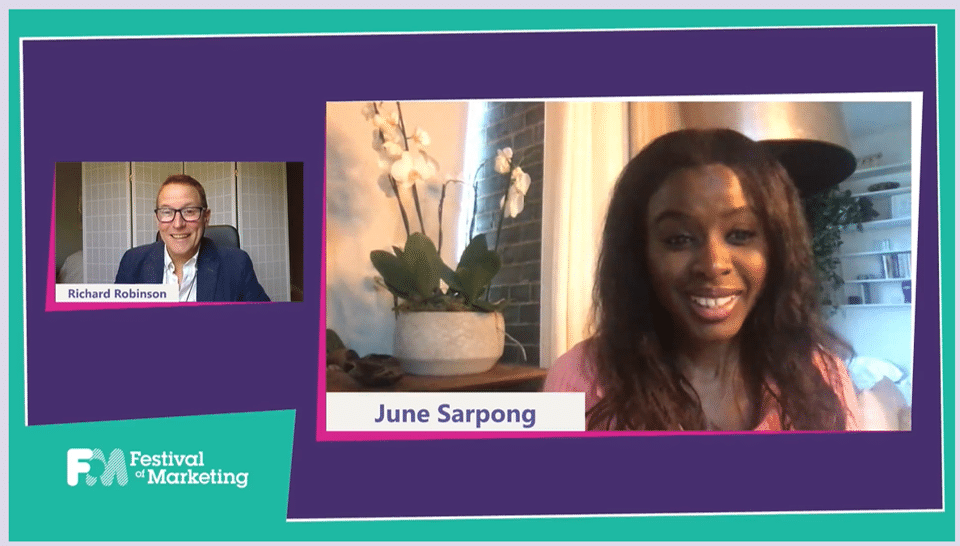
June talked about the value of the opportunity that sits in the UK economy from improved diversity and inclusion: £127bn. “The cost of not being a white man in society — that’s what it costs everyone who isn’t — is £9,300 a year. If everyone had it, imagine what we could put back into the economy”.
She also talked about her own experience, how her work experience at Kiss FM whilst at school started on her current path, how diverse teams significantly outperform non diverse teams, and how customers now demand action. “The customer is demanding it. The customer is asking all sorts of pertinent questions they never would have before. Show me your executive committee. Show me what you are doing to support under-privileged communities. If you are going to future proof your business you have got to figure it out.”
Loyalty marketers everywhere need to sit up and address this important issue. A good starting point would be to read Diversify, June’s book on the subject.
Takeaway: What are you doing to improve your diversity and inclusiveness? What are you doing now? Where can you go for help?
5) How can you help the planet?
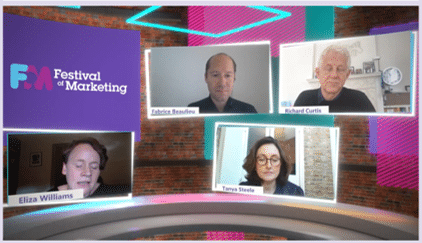
Last, but not least, sustainability was raised by multiple speakers and featured through-out the Festival. My favourite session was “The future of business: How marketing can respond to the climate and nature crisis” that posed the important question of what can and should marketers be doing to address the crisis. Speakers from WWF (Tanya Steele), Reckitt Benckiser (Fabrice Beaulieu), and Richard Curtis addressed the question.
Fabrice talked about how he sees 2 sets of brands in the world who are trying to help:
- “Brands which have focussed (so far) on limiting and reducing their negative impact on society and the environment e.g. commitments to recycling, plastics, less waste. That’s great and that’s one group of action”.
- “There’s a another set of brands that have tried to broaden their impact, increase the scope of what they do, leverage their talent and their voice into creating a positive impact for change”.
As loyalty marketers, charged with building long term relationships with our members, I would charge that there is no greater long-term ambition than helping the planet. That we should all be in group 2. And that there is more that we could all do to make a positive impact. The panel discussed how brands should fine a purpose aligned to their history, their values and what they offer, and then make that part of their positive difference. IKEA was touted as a brand doing great things — from their recent announcements about recycling furniture to instore tests where they turned the temperature up 4 degrees so customers could see how it felt. A brand to watch and emulate, though I personally think IKEA Family could do more.
Takeaway: How can you help the planet? What can your positive impact be? How can your loyalty programme support and encourage your brand to do more?
Conclusion
Festival of Marketing 2020 was an absolutely fantastic, inspiring, thought-provoking event. I hope these 5 challenges provoke big questions for your 2021 planning. And, if you get the chance, check out the Festival itself, whilst all the content is available to watch digitally (until the end of October).
Charlie Hills is the Managing Director & Head of Strategy at Mando-Connect and a featured contributor to Wise Marketer.



